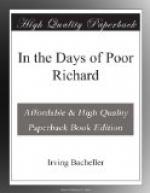They spent a night in the little cabin tavern of Bill Scott on the upper waters of the Mohawk. Mrs. Scott, a comely woman of twenty-six, had been a sister of Solomon’s wife. She and the scout had a pleasant visit about old times in Cherry Valley where they had spent a part of their childhood, and she was most thoughtful and generous in providing for their comfort. The Scotts had lost two children and another, a baby, was lying asleep in the cradle. Scott was a hard working, sullen sort of a man who made his living chiefly by selling rum to the Indians. Solomon used to say that he had been “hooked by the love o’ money an’ et up by land hunger.”
“You’ll have to git away from The Long House,” Solomon said to Scott. “One reason I come here was to tell ye.”
“What makes ye think so?” Scott asked.
“The Injuns’ll hug ye when they’re drunk but they’ll hate ye when they’re sober,” Solomon answered. “They lay all their trouble to fire-water an’ they’re right. If the cat jumps the wrong way an’ they go on the war-path, ye got to look out.”
“I ain’t no way skeered,” was Scott’s answer. He had a hoarse, damp voice that suggested the sound of rum gurgling out of a jug. His red face indicated that he was himself too fond of the look and taste of fire-water.
“Ye got to git erway from here I tell ye,” Solomon insisted.
Scott stroked his sandy beard and answered: “I guess I know my business ’bout as well as you do.”
“Le’s go back to Cherry Valley, Bill,” the woman urged.
“Oh, keep yer trap shet,” Scott said to her.
“He’s as selfish as a he-bear,” said Solomon as he and Jack were leaving soon after daylight. “Don’t think o’ nuthin’ but gittin’ rich. Keeps swappin’ firewater fer land an’ no idee o’ the danger.”
They left the woman in tears.
“It’s awful lonesome here. I’ll never see ye ag’in,” she declared as she stood wiping her eyes with her apron.
“Here now—you behave!” Solomon exclaimed. “I’ll toddle up to your door some time next summer.”
“Mirandy is a likely womern—I tell ye,” Solomon whispered as they went away. “He is a mean devil! Ain’t the kind of a man fer her—nary bit. A rum bottle is the only comp’ny he keers fer.”
They often spoke of the pathetic loneliness of this good-looking, kindly, mismated woman. Jack and Solomon reached the council on the fifth day of their travel. There, a level plain in the forest was covered with Indians and the snow trodden smooth. Around it were their tents and huts and houses. There were males and females, many of the latter in rich silks and scarlet cloths bordered with gold fringe. Some wore brooches and rings in their noses. Among them were handsome faces and erect and noble forms.
In the center of the plain stood a great stack of wood and green boughs of spruce and balsam built up in layers for the evening council fire.




